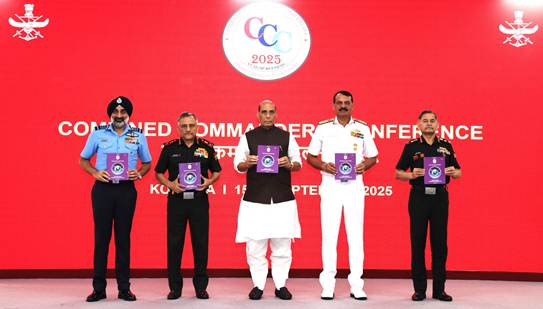The Armed Forces have announced the creation of a single Tri Services Education Corps by merging the education branches of the Army, Navy and Air Force. The decision was taken on the final day of the Combined Commanders’ Conference (CCC) 2025 in Kolkata, which concluded on September 17.
The move represents a major step in fostering jointness and integration across the Armed Forces, streamlining the management of education, training and knowledge dissemination within the services. The conference also announced the formation of three Joint Military Stations to strengthen coordination and operational synergy across regions.
Chief of Defence Staff (CDS) General Anil Chauhan chaired the deliberations, reviewing directions earlier given by the Prime Minister and the Defence Minister, and discussing a roadmap to implement them in a time-bound manner. Officials said the discussions centered on enhancing interoperability, reforming institutional structures, and aligning defence priorities with national security objectives.
The conference this year carried the theme “Year of Reforms – Transforming for the Future”, signaling the focus on restructuring and modernization. Senior military leaders underlined the importance of adopting a technology-led approach to modern warfare, with innovations to be seamlessly integrated into operational doctrine. Domains such as space, cyber, information and special operations were highlighted as critical to future readiness.
Over three days, the apex-level forum brought together Chiefs of Staff, Commanders and senior officials from the Ministry of Defence. The sessions facilitated strategic and conceptual dialogue, aimed at shaping the future roadmap of the Armed Forces.
The event commenced with a high-impact demonstration by the Joint Operations Command Centre, followed by a live Air Defence exercise. The demonstration showcased advanced capabilities in air surveillance, missile defence and counter-drone operations, emphasizing the military’s preparedness to tackle evolving threats.
Subsequent discussions examined the shifting paradigms of multi-domain warfare in the context of rapid technological change. Leaders stressed that interoperability and joint planning were essential to ensure the services can operate effectively in complex and hybrid battlefields.
A comprehensive review of major reforms carried out over the last two years was also presented, giving clarity on progress achieved in joint operations, organizational restructuring, and modernization efforts. Officials noted that the review helped identify gaps while reaffirming the momentum of reforms.
The decision to establish a unified education corps reflects the push towards eliminating redundancies and building a common framework for knowledge and training across the three services. Defence analysts said the move could lead to more efficient use of resources, standardization of curricula, and better cross-service understanding. Similarly, the creation of Joint Military Stations is expected to streamline operational readiness by pooling logistics, command and infrastructure across services.
The Ministry of Defence described the CCC as a pivotal platform for shaping future reforms, guiding capability development, and aligning the Armed Forces with national security priorities. The 2025 edition of the conference reinforced the vision of transitioning to a future-ready force, capable of leveraging technology while rooted in joint structures.
By emphasizing reforms and integration, the CCC 2025 has sought to lay the foundation for a modern, cohesive defence establishment. The announcement of the Tri Services Education Corps and the new military stations stands out as a symbol of the broader transformation underway, signaling a shift towards jointness and long-term preparedness.





